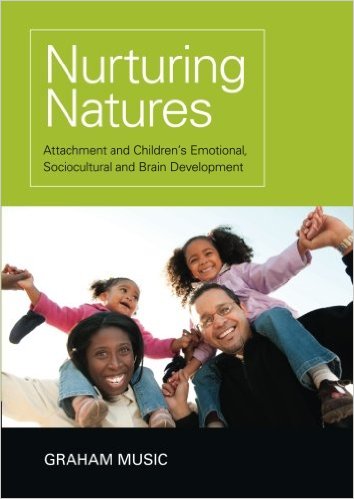Nurturing Natures

“Nurturing Natures; Attachment and Children’s Emotional, Sociocultural and Brain Development” by Graham Music.
Review by Mel Newton, mother of 1, Sussex
Star rating ⭐️⭐️⭐️⭐️⭐️
Rich in the most current scientific research, yet engaging and accessible; A deeply informative and inspiring read for anyone involved with the care and wellbeing of children and young people.
Graham Music
Graham Music is a widely experienced psychotherapist who works with children as well as adolescents, adults and families. Music has first taken the most current scientific research findings in several key areas of children’s development. He then distilled them into this easily readable and highly informative book.
‘Nurturing Natures’
This book provides a thorough exploration of children’s developmental processes and needs from pre-birth to adolescence; and pays particular attention to the child’s emotional and social development. The main topics covered are: attachment, early brain development and the nervous system, childcare, siblings, learning, cultural influences, childhood trauma and resilience.
This book is almost like a handbook
This book is large and detailed and is presented almost like a handbook, so that it can be dipped into for specific areas of interest. The diversity of information is also well enough integrated that it can be read in one go – if you are a serious reader! Despite the amount of information in the book to digest, the research and facts presented are so interesting, and Music’s voice so warm and engaging, I was able to enjoy reading the whole book through in one (slow) go.
Who does it appeal to?
I think this book will particularly appeal to those who are interested in famous psychological experiments and who like to understand how we humans tick. It will also appeal to those who really want to make scientifically informed decisions on their approach to child care. In addition, with its detailed exploration of the role of play in the child’s learning and development, this book will be of much interest to anyone working with or interested in children’s play.
Strengths
The main strengths of Music’s writing for me are balance and sensitivity. As an overview, the book addresses the age old nurture/nature debate in a very balanced way. Current research into neuroscience and genetics seems to lean towards the influence of nurture in child development, but Music provides examples of research from both sides of the debate and offers a balanced and fascinating description of how nurture and nature influence each other.
Adoption
Another way that the book takes a balanced view, is by looking at issues such as child care or adoption within broader cultural contexts. For example, Music discusses how common adoption, or temporary child rearing outside of the immediate family is in other societies such as Papua New Guinea or Brazil, and how different the impacts are in these contexts to our own society where this is rarer. Music also discusses, with much insight, subjects not well-covered by many parenting or child care books; such as the role of fatherhood, and parenting in non-traditional families.
Research
Music provides incredible research into foetal and early infant development that would make enriching reading for new parents. A word of warning though, for parents who had difficulties at this stage this could make for tough reading. Having said this, Music tackles emotive topics like pre-birth stress and foetal development, prematurity, and bonding/attachment difficulties with great sensitivity; and again, with balance, non-judgement and a wider context view.
As a parent, I think I will find the sections on the adolescence most useful in a short time ahead. As a professional, I will be recommending this book often. And I think I will be quoting a lot of the relevant research from the book in meetings!
Update: 2nd edition published 24 October 2016.
Read the review of “The Genius of Natural Childhood“.
Read the review of “The Whole Brain Child“.
